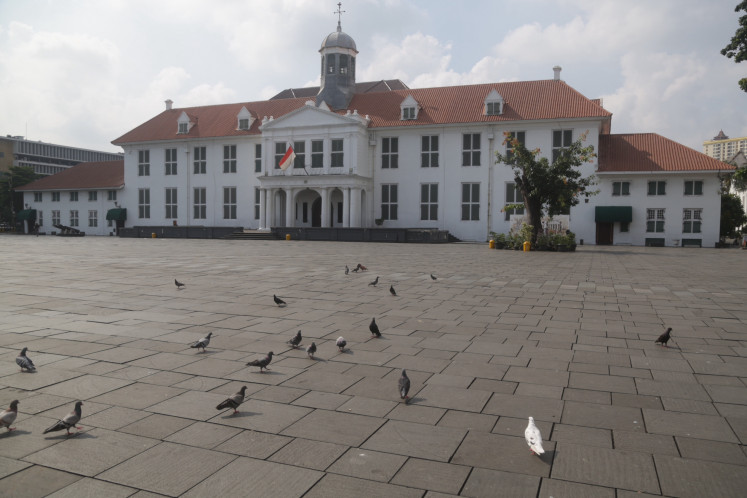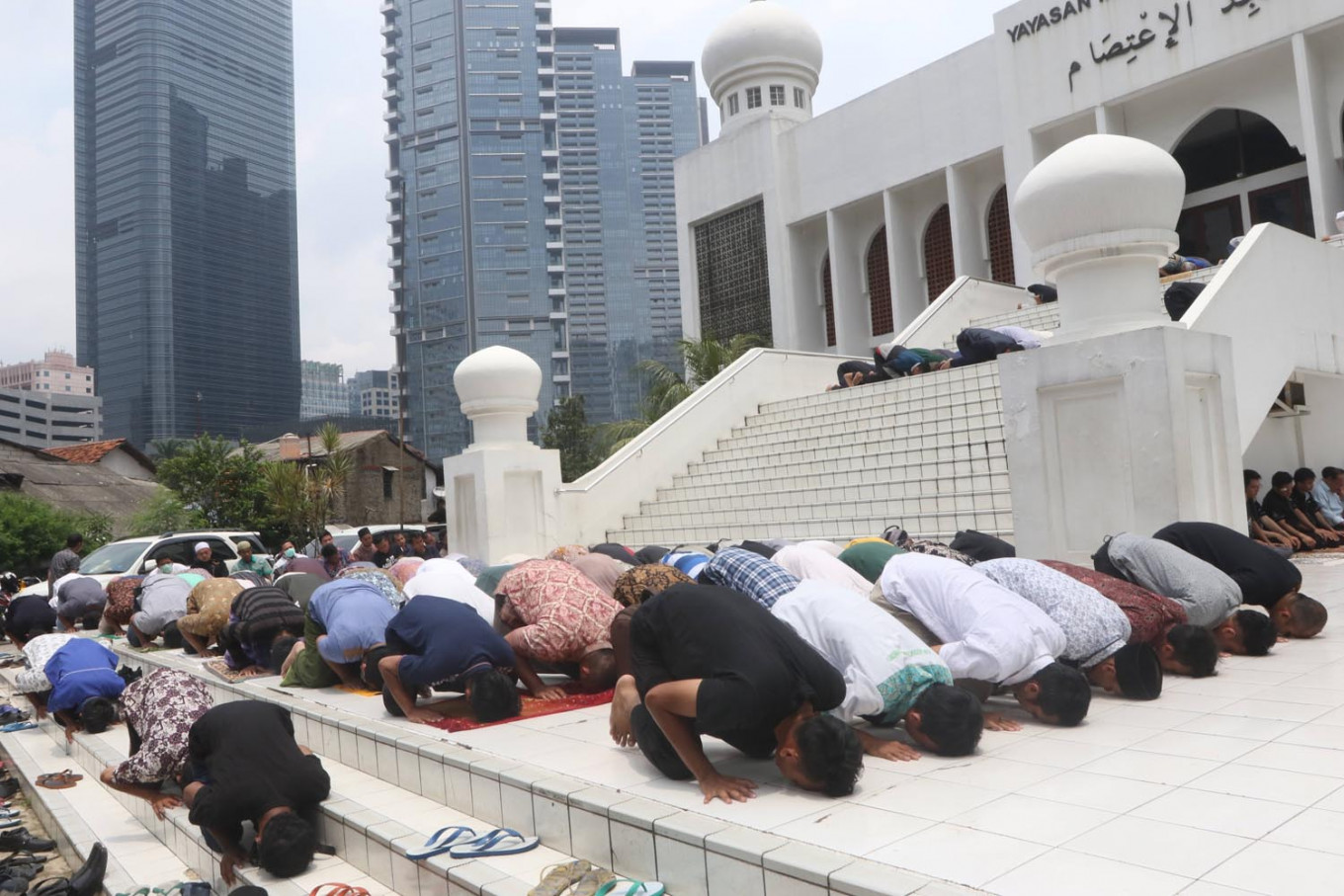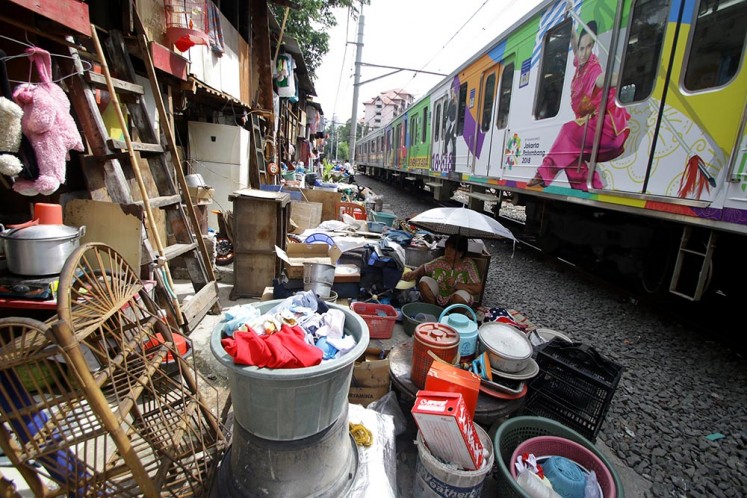Popular Reads
Top Results
Can't find what you're looking for?
View all search resultsPopular Reads
Top Results
Can't find what you're looking for?
View all search resultsJakarta mobilizes community to contain COVID-19 after lockdown option out
On Friday, several mosques in Jakarta still held a mass Friday prayer, including a mosque in Tebet, South Jakarta, despite an Indonesian Ulema Council (MUI) fatwa to avoid crowds.
Change text size
Gift Premium Articles
to Anyone
J
akarta, the country’s epicenter of the coronavirus disease (COVID-19), is struggling to find another strategy to contain the spread of the virus after a partial lockdown was taken off the table.
With the increasing number of cases but limited alternatives, Jakarta Governor Anies Baswedan ordered his subordinates down to the neighborhood level to campaign for social distancing, as many people have yet to grasp the urgency of the situation.
Read also: 'If not us, who else will do it?': Sweat and tears of Indonesia's COVID-19 nurses, doctors
Anies also issued a call on Friday for Jakartans not to leave the city for three weeks to help Jakarta avoid the same fate as “other countries”. He had warned that Jakarta could become like Italy if the people did not practice social distancing.
On Friday, however, several mosques in Jakarta still held a mass Friday prayer, including a mosque in Tebet, South Jakarta, despite the Indonesian Ulema Council (MUI) fatwa to avoid crowds.
Densely populated areas
The spread of the virus could become even more uncontrollable if the virus reaches the city’s densely populated areas known as kampungs.
A resident sits in front of her house in a densely populated area near the railway in Central Jakarta. (Antara/Rivan Awal Lingga)As of Friday, Indonesia had recorded 369 confirmed cases with 32 deaths, the highest toll in Southeast Asia. Nearly 60 percent of COVID-19 deaths in the country have been recorded in Jakarta.
The capital, home to at least 10 million people, recorded 223 confirmed cases and 294 suspected cases, with 345 people under surveillance, according to the city’s official website corona.jakarta.go.id as of Friday at 4 p.m. The death toll in the city alone reached 19, making its death rate, 8.5 percent, much higher than the global average of 3.9 percent.
While the data from Jakarta does not show whether the virus has reached densely populated areas or not, experts have warned of a higher risk of contracting the coronavirus for the urban poor living in informal settlements due to the more crowded living conditions.
Statistics Indonesia's (BPS) Jakarta office recorded that Jakarta had 445 community units (RWs) categorized as slums, comprising 15 RWs categorized as heavy, 99 moderate, 205 light and 126 very light.
Handwashing and maintaining self-hygiene is a basic precaution against the coronavirus, but the agency recorded in 2018 that 15 percent of Jakarta’s population lacked access to proper sanitation.
A researcher at the London-based International Institute for Environment and Development, Cecilia Tacoli, said proximity was an important driver of infection.
“Given that new infectious diseases will likely continue to spread rapidly into and within cities, low-income settlements need more effective infrastructure," she said as quoted by Thomson Reuters Foundation.
Mobilizing community
Anies has ordered subdistrict heads to ensure all residents are informed about the virus and prevention methods, as well as the measures the administration has implemented, such as the social distancing campaign and prohibition of mass gatherings.
“Subdistrict heads will cooperate with RT and RW heads to ensure all [residents] are aware of the risk of transmission. [...] That should be done at the grassroots level,” Anies told reporters on Thursday.
Despite the planned attempt, low-income groups who live in densely populated areas have so far learned on their own about the coronavirus through social media and the media.
Kampung Marlina resident in North Jakarta, Paryati, said the kampung residents had mostly relied on information shared through WhatsApp groups.
She also said the limited access to personal hygiene equipment, in particular hand sanitizer, had forced the community to produce their own hand sanitizer for local use.
“Not only is it difficult to find [hand sanitizer] at stores, but it is also pricey,” she told The Jakarta Post on Thursday.
Marsa, who lives in a a temporary shelter for evicted families along with other 32 families in Kampung Kunir in West Jakarta, said he and his neighbors understood that maintaining their health was the best precaution.
 Anies Baswedan closed several tourist destinations on March 13.">
Anies Baswedan closed several tourist destinations on March 13.">
“We try not to panic because [whether we contract the virus or not] depends on our belief [in God], but still we protect ourselves by washing our hands and drinking [herbal drinks],” he said.
Despite there having been no reported COVID-19 cases in the city's kampungs so far, according to Paryati and Marsa, who are both active in Urban Poor Linkage (JRMK), the presence of the virus had been a strain on their finances.
“What we are thinking about now is how to make ends meet,” Marsa told the Post.
Many kampung residents rely on crowd activivies on the streets and tourist destinations like Ancol Dreamworld Park and Kota Tua. The closure of tourist destinations and the drop in foot traffic has hurt their income.
The government suggestion to stay at home is oftentimes not feasible for residents who have to leave home to earn money.
Home isolation
Another threat comes from the overwhelmed hospitals, which forced the Jakarta administration to impose home isolation on hundreds of people suspected of having COVID-19. Moreover, dozens of people who tested positive with mild symptoms are also under home isolation.
Read also: Dozens of COVID-19 positive people are in home isolation in Jakarta. How does it work?.
The problem with this policy is that the protocol relies on the conscience of every isolated patient not to leave home and spread the virus.
Home isolation in a densely populated area is even riskier because of the constrained space and rooms that are often shared, said Annie Wilkinson, a research fellow at research organization the Institute of Development Studies, Thomson Reuters Foundation reported.
Paryati and Marsa both acknowledged that self isolation for families in kampungs was not possible.
“I don’t think it is possible to self-isolate. We would need help from the healthcare systems and the government,” Marsa said.
Public health expert from the University of Indonesia (UI), Hasbullah Thabrany, called on the city administration to utilize unused places such as schools left by students as temporary “isolation wards”. The government is preparing the Athletes Village in Kemayoran to be turned into a COVID-19 isolation facility.
In a broader view, experts have urged the government to consider the various economic and social backgrounds of society in an attempt to suppress the impacts of the COVID-19 pandemic.
“This can be done, for example, by strengthening poverty eradication programs and establishing universal health coverage for low-income households," I Nyoman Sutarsa from Rural Clinical School at the Australian National University (ANU) and Atin Prabandari from Gadjah Mada University expressed their views in an article first published by The Conversation. (fqh)











